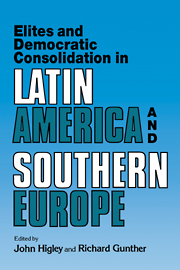Book contents
- Frontmatter
- Contents
- About the contributors
- Preface
- 1 Introduction: elite transformations and democratic regimes
- 2 Spain: the very model of the modern elite settlement
- 3 Elite settlements and democratic consolidation: Colombia, Costa Rica, and Venezuela
- 4 Mexico's elite settlement: conjuncture and consequences
- 5 Elite unification and democratic consolidation in Italy: a historical overview
- 6 The role of civil–military pacts in elite settlements and elite convergence: democratic consolidation in Uruguay
- 7 Patterns of elite negotiation and confrontation in Argentina and Chile
- 8 Elites in an unconsolidated democracy: Peru during the 1980s
- 9 Brazil's political transition
- 10 Redefining the Portuguese transition to democracy
- 11 The Dominican case
- 12 Elites and democratic consolidation in Latin America and Southern Europe: an overview
- Index
11 - The Dominican case
Published online by Cambridge University Press: 05 June 2012
- Frontmatter
- Contents
- About the contributors
- Preface
- 1 Introduction: elite transformations and democratic regimes
- 2 Spain: the very model of the modern elite settlement
- 3 Elite settlements and democratic consolidation: Colombia, Costa Rica, and Venezuela
- 4 Mexico's elite settlement: conjuncture and consequences
- 5 Elite unification and democratic consolidation in Italy: a historical overview
- 6 The role of civil–military pacts in elite settlements and elite convergence: democratic consolidation in Uruguay
- 7 Patterns of elite negotiation and confrontation in Argentina and Chile
- 8 Elites in an unconsolidated democracy: Peru during the 1980s
- 9 Brazil's political transition
- 10 Redefining the Portuguese transition to democracy
- 11 The Dominican case
- 12 Elites and democratic consolidation in Latin America and Southern Europe: an overview
- Index
Summary
On August 16, 1978, Antonio Guzmán was inaugurated as president of the Dominican Republic. Although such an event might be taken for granted in many countries, for the Dominican Republic it was the first time that political power was transferred peacefully from one president to another. Before the 1978 election, political office was determined more by force than by electoral procedures. Since that watershed election, the ballot box has determined the nation's political leadership, and irregular seizures of power have been nonexistent. In 1982, national elections were again held and, although there were some discrepancies, the political parties and the military accepted the results. The 1986 elections produced yet another peaceful transfer of power. The most recent elections, on May 15, 1990, were historically symbolic, juxtaposing two long-standing political rivals – Joaquín Balaguer, the incumbent, and Juan Bosch, a man who had been ousted by a military golpe in 1963. Although the elections were very close and there was some question of fraud, Bosch accepted his defeat, and Balaguer was inaugurated president for the fifth time since 1966.
The 1978 democratic transition thus represents an important and abrupt departure from traditional Dominican politics. Although political repression and irregular seizures of power had characterized the political climate of Dominican politics from the time of independence, since 1978 free and competitive elections have served as the vehicle for transferring political power.
- Type
- Chapter
- Information
- Publisher: Cambridge University PressPrint publication year: 1991

